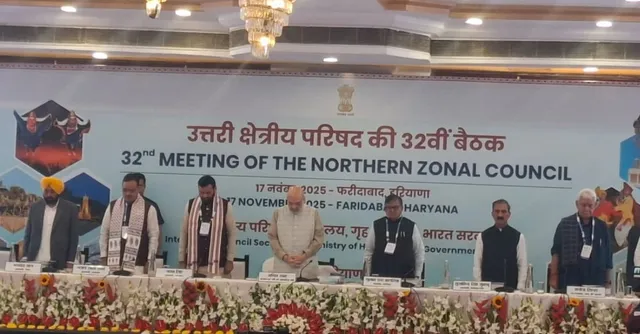- By ANI
- Mon, 17 Nov 2025 02:23 PM (IST)
- Source:ANI
The 32nd Northern Zonal Council meeting commenced in Faridabad on Monday on a sombre note, as Union Home Minister Amit Shah, along with top leadership from eight states and Union Territories, observed a two-minute silence to pay tribute to the victims of the November 10 Delhi car blast.
Chaired by Union Home Minister Amit Shah, the meeting was attended by the Chief Ministers of Haryana, Himachal Pradesh, Punjab, and Rajasthan, as well as the Lieutenant Governors and the Administrator of Delhi, Jammu and Kashmir, Ladakh, and Chandigarh. Senior officials from the Centre, state governments and Union Territories were also in attendance.
The Council provides a stage for resolving and progressing issues and disputes between the Centre and the member states, as well as UTs. Issues of national importance, including the speedy investigation of cases of sexual offences against women and children and the implementation of Fast Track Special Courts (FTSC) for their swift disposal.
The meeting also discussed providing brick-and-mortar banking facilities within the designated areas of every village, implementing the Emergency Response Support System (ERSS-112), and various regional-level common interest issues, including strengthening nutrition, education, health, electricity, urban planning, and the cooperative system.
Shah is the chairperson of the Council, and the Chief Minister of Haryana serves as its vice-chairperson.
This meeting is being organised by the Inter-State Council Secretariat of the Ministry of Home Affairs with the Haryana government as its host.Under Sections 15 to 22 of the States Reorganisation Act, 1956, five Zonal Councils, including the Northern Zonal Council, were established. The Chief Minister of one member state (rotating every year) acts as the vice-chairperson. From each member state, the Governor nominates two ministers as members of the council.
Each Zonal Council has also formed a permanent committee at the level of Chief Secretaries. Issues proposed by the states are initially presented to the permanent committee of the concerned Zonal Council for discussion.
#WATCH | Union Home Minister Amit Shah chairs the 32nd meeting of the Northern Zonal Council in Haryana's Faridabad.
— ANI (@ANI) November 17, 2025
The meeting began with a brief silence held in remembrance of those who lost their lives in the November 10 Delhi car blast.
The Northern Zonal Council… pic.twitter.com/rji64xHQSx
After consideration by the permanent committee, the remaining issues are then presented to the Zonal Council meeting for further deliberation.
With the belief that strong states make a strong nation, the Zonal Councils provide a structured mechanism for dialogue and discussion on issues affecting two or more states or the centre and states, and through this, serve as an important platform to enhance mutual cooperation.
ALSO READ: Delhi: RTI Reveals 18 Rabies Deaths Since 2022, Contradicting Govt’s ‘Zero Fatalities’ Claim
The role of the Zonal Councils is advisory; however, over the past few years, these councils have proven to be a crucial factor in fostering healthy bonds of mutual understanding and cooperation across various fields.With the cooperation of all state governments, central ministries, and departments, a total of 63 meetings of the various Zonal Councils and their permanent committees have been held in the last eleven years.
(Disclaimer: Except for the headline, this article has not been edited by The Daily Jagran staff and has been published through syndicated feed by ANI)

